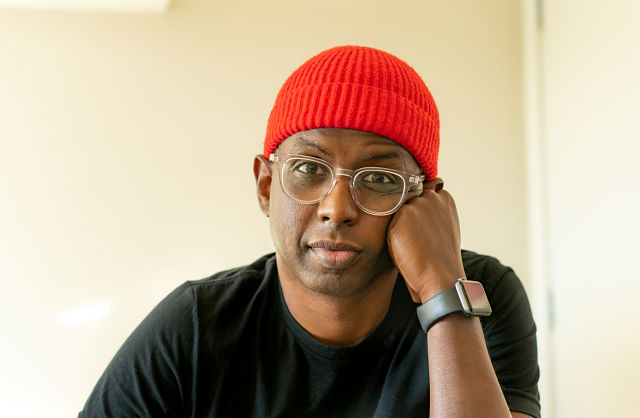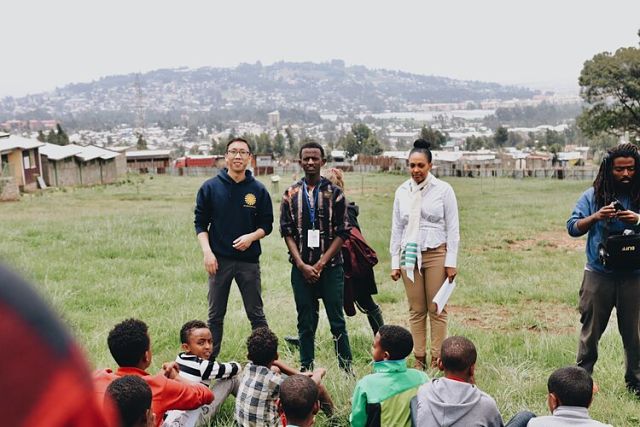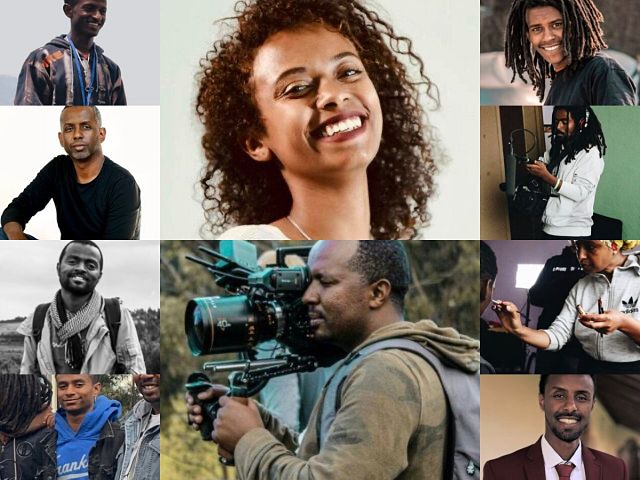 The short film by U.S. and Ethiopian crew including Ethiopian American producer Bemnet Yemesgen (pictured above) is based on a true story of a teenager named Abel who, like thousands of other young people in Addis Ababa, finds himself on the brink of becoming a street peddler. (Courtesy photo)
The short film by U.S. and Ethiopian crew including Ethiopian American producer Bemnet Yemesgen (pictured above) is based on a true story of a teenager named Abel who, like thousands of other young people in Addis Ababa, finds himself on the brink of becoming a street peddler. (Courtesy photo)
Tadias Magazine
By Tadias Staff
Updated: December 13th, 2020
New York (TADIAS) — The Other side, a new film from Ethiopia, released in the United States during Thanksgiving week sheds light on the crisis of abandoned children in Ethiopia.
The short film by U.S. and Ethiopian crew led by Ethiopian American producer Bemnet Yemesgen is based on a true story of a teenager named Abel who, like thousands other young people in Addis Ababa, finds himself on the brink of becoming a street peddler. Abel is required to vacate the orphanage where he grew up when he turns 18 in a few days, leaving behind his younger brother and without any social safety net to support him as he must navigate life into adulthood as a homeless person.
Abel’s story is the epitome of a much larger problem that personifies the lives of millions of youth across the country who grow up without parents — most of whom were deserted at birth primarily because of poverty. UNICEF estimates that there are 4.5 million orphans in Ethiopia. The non-profit organization, SOS Children’s Villages, cites government statistics, and notes that in some cities such as the university city of Jimma “unmarried mothers, many of them teenagers, abandon their babies at a rate of two to three a day. Babies are abandoned at hospitals. They are left at police stations. They are put on the side of the road.” The Guardian has recently published an article tilted “Homeless Children Struggle to Survive on the Streets of Ethiopia’s Capital,” and like Abel many of them eventually find their way to Addis Ababa.
The Guardian adds:
Driven from their rural homes by family problems and lack of opportunity, more and more children are making for Addis Ababa. Alone and vulnerable, they receive no state support…Children as young as six come to the city to escape rural drudgery and, in many cases, family breakdown. “The reason is always poverty – but poverty plus [something else],” says the country director of Retrak Ethiopia, an organization that rescues street children in Addis Ababa and reunites them with their families. One recent survey found that almost half the street children sampled were living with step-parents because their biological parents had died, divorced or separated. Most come from rural villages, and especially from what researchers call Ethiopia’s “southern corridor” of migrant-sending communities, where a tradition of relocation to Addis Ababa and even further afield is well established.
In the film the The Other Side — which was developed in collaboration with NGOs including DC-based Orphan Care Ethiopia and Great Commission Ministries — Grammy-nominated Ethiopian-American recording artist Wayna plays a counselor in Abel’s orphanage called Mihret, while Abel is portrayed by American actor Ethan Herisse who is also the star of the Emmy-winning Netflix series When They See Us directed by Ava DuVernay. The film also features newcomer Adonai Girmaye Kelelom, a 15-year-old Ethiopian actor, who plays an orphan named Kiya. The filmmakers note that “though the role of Kiya stands as Kelelom’s professional debut, portraying this role has been one of ‘the best experiences [he’s] ever had,’ and has inspired him to pursue a career in acting. He aims to study acting as well as neuroscience in the United States in the near future.”

Grammy-nominated Ethiopian-American recording artist Wayna along with producer Bemnet Yemesgen and writer and director Josh Leong during the filming process in Ethiopia. (Courtesy photo)

The Ethiopia film crew. (Courtesy photos)
In addition to Bemnet — an Ethiopian-American producer, writer, and director — the film’s Ethiopia crew includes Frehiwot Berhane (Casting Director), Yabsra Megersa (Unit Production Director), Daniel Belay (First Assistant Camera), Beferdu Teffera (Sound Mixer), Temima Hulala (Key Makeup Artist), Tedos Teffera (Location Manager), Yodahe Zerihun (Translator), Abdirebi Daniel (Translator) and Nahom Semunegus (Boom Operator).
On its website the U.S. team states that “in order to allow the country to tell its own story, we wanted to collaborate with Ethiopian filmmakers in and around Addis Ababa.” They include writer and director Josh Leong, Producer and Assistant Director Sofia Bara, Director of photography Tom Ingwersen, Associated Producer Sophia Loren Heriveaux, Marketing Directors Celia Tewey and Grace Sessinghaus, Script Supervisor Olivia Bfournier, Art Director Cameron Protzman and Director of Business Development Phillip Kearney.
In a press release the filmmakers emphasize that “The Other Side seeks to raise awareness for Ethiopia’s abandoned children crisis through narrative film, and the team is currently seeking partners for the development of a feature-length version of the film.” The media release adds: “The film has reached the eyes of Ethiopian Ambassador Fitsum Arega, as well as the Ethiopian Embassy in Washington DC. The nation’s capital is actually the second largest Ethiopian city in the world (by population), behind Addis Ababa.”
So far “the film has been accepted into 10 major festivals (4 Academy Award®-Qualifying), winning Best Short at the Greenwich International Festival. THE OTHER SIDE enjoyed an NYC Premiere at the Urbanworld Film Festival and an LA Premiere at the Los Angeles Asian Pacific Film Festival, in partnership with HBO and WarnerMedia. The film was also included at the 2020 Cannes Film Festival Court Metrage.”
—
You can learn more about the film at www.theothersideshortfilm.com.
Instagram: https://www.instagram.com/theothersidefilm2020/
Facebook: https://www.facebook.com/theothersidefilm2020
Join the conversation on Twitter and Facebook.

























